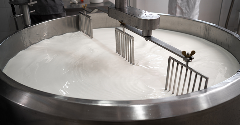News
Arla to shed jobs in Middle East move
7 Jun 2019Parts of the production at three Arla Foods sites will be moved to newly acquired site in the Middle East as part of the farmer-owned company’s aim to bring new commercial opportunities to customers as well as its ongoing efforts to make its supply chain more efficient.
The move is not expected to take place until late 2020 and mid-2021, but Arla Foods says it is announcing the change in advance to ensure a smooth and transparent transition as well as timely solutions for affected staff.

In December 2018, Arla Foods announced an agreement with Mondeléz International to acquire its processed cheese business in the Middle East region, which is currently licensed under the Kraft brand. This deal was formally completed on May 28th, and Arla has now taken over the acquired operations.
The acquisition also gives Arla full ownership of a cheese production site in Bahrain, which provides Arla with the opportunity to further expand the company’s branded cheese production in the Middle East and North Africa region and to further improve overall efficiency in its supply chain.Following the acquisition, Arla is now announcing its decision to move certain processed cheese and sterilized cream production lines from its Bislev and AKAFA sites in Denmark and from its Riyadh site in Saudi Arabia – all to the newly acquired site in Manama in Bahrain.There are still a number of factors that can change the final numbers, Arla says. However, it is Arla’s current estimate that the following volumes will be moved:+ Approx. 26,000 tons (annually) of processed cheese from Bislev, potentially impacting approx. 40 jobs+ Approx. 18,000 tons (annually) of sterilized cream from AKAFA, potentially impacting approx. 35 jobs+ The volumes of processed cheese to be moved from Riyadh is still to be confirmed.“It makes a lot of sense for us to place the production of these exact products at the newly acquired site in Bahrain, since these products are primarily made for the Middle East and North Africa and in lesser degree for other markets. It gives us a strong regional supply chain footprint that enables us to secure long-term competitiveness in the region through scale and efficiency, and the pilot plant at our new Bahrain site will allow us to innovate in new ways within this category,” said Head of Supply Chain in Arla, Executive Vice President Sami Naffakh.Located in Manama, Bahrain the newly acquired site currently has a capacity exceeding 66,000 tons. Built in 2008, it includes an on-site innovation pilot plant and has won multiple awards for manufacturing excellence within core cheese categories. By moving the production of processed cheese and sterilized cream to this site, Arla also expects to improve the shelf-life of these products by four weeks as transport time to customers in MENA is reduced significantly.The announced changes will not be fully implemented until late 2020 and mid-2021. However, Arla has chosen to inform employees at the three affected sites now."It is important for us to be as open about the future as we can be with our employees, and since the coming months will require a high degree of involvement of staff at each affected site we have decided to inform our employees now about the decision to move parts of our production to the new site in Bahrain,” said Naffakh.“As soon as we are able to confirm the exact volumes that will be moved, we will engage with affected employees to ensure they are supported to move on in a good way, either to jobs at other Arla production sites or outside Arla. We have a good track record of finding ways to help people into new job opportunities, especially when there is a relatively long time period of time in which to work this out. They can bring valuable production expertise to our other sites, which is an opportunity we do not want to miss," said Naffakh.Related news

Consumers dislike faba beans’ sensory profile
3 Jun 2024
Consumers display low acceptance of faba beans, with sensory properties such as bitterness a core concern, a study suggests. However, for product varieties such as cocoa-free chocolate, this attribute could prove to be a benefit.
Read more
Food scientists uncover new way to preserve nutrient and flavour quality
29 May 2024
Researchers have developed a method that guarantees food safety for low-moisture products, such as dried milk, while maximising quality by retaining vitamins, minerals, and flavours, they say.
Read more
FDA scrutinizes milk pasteurisation over HPAI risk
28 May 2024
The US Food and Drug Administration (FDA) is undertaking additional scientific research work to ensure that approved pasteurization processes are rigorous enough after retailer milk tests showed contamination from Highly Pathogenic Avian Influenza (HPA...
Read more
Magnum targets ice cream lovers’ moods with new flavours
2 May 2024
Unilever-owned Magnum has released a suite of “mood-inspired flavours” as the 2024 ice cream season kicks off. The offerings, marketed as the Magnum Pleasure Express, are Magnum's first foray into the “mood-food” category.
Read more
The eight global food trends shaping the future of dining
23 Apr 2024
Unilever’s Future Menu Trend 2024 report identifies the global food trends shaping the food service industry, providing insights into changing consumer preferences that could provide inspiration for packaged food and drink brands.
Read more
Report outlines how the US interfered with marketing restrictions on formula across the globe
18 Apr 2024
A recent investigative report by ProPublica unmasked the extensive interference by the US government in international regulations concerning the marketing of formula.
Read more
Ultra-processed food intake in South Africa at concerning levels, study suggests
19 Mar 2024
As South Africa considers introducing front-of-pack warning labels and strict marketing limits for unhealthy foods, research has found that low-income South Africans get around half of their calories from ultra-processed foods (UPFs) – “a cause for con...
Read more
India’s mithai market develops new ingredient and flavour profiles
18 Mar 2024
Mithai is a hugely popular dessert and sweet snack in India and manufacturers are experimenting with unique ingredients, new flavour combinations, and healthier versions to capture new audiences.
Read more
Unilever and Perfect Day’s animal-free dairy dessert: Is precision fermentation the future of dairy?
6 Mar 2024
Perfect Day, a precision fermentation dairy supplier, has partnered with Unilever's Breyers, a brand of ice cream and frozen dairy desserts, to launch Breyers lactose-free chocolate frozen dessert.
Read more
Macauba oil emerges as potential rainforest-friendly palm oil alternative
1 Mar 2024
Producers and researchers consider the rainforest-friendly credentials of Macauba palm oil and whether its sustainability credentials offer an opportunity to replace palm oil.
Read more